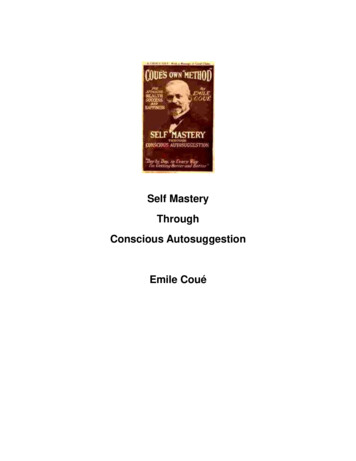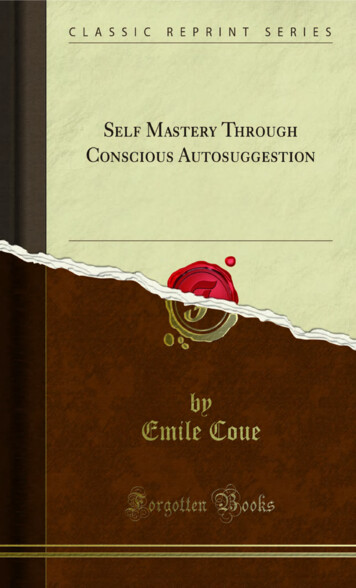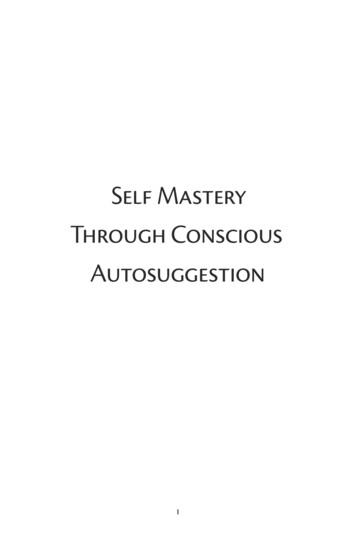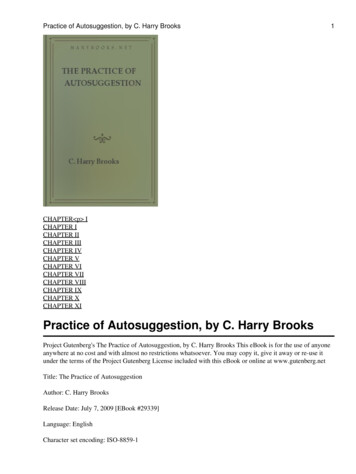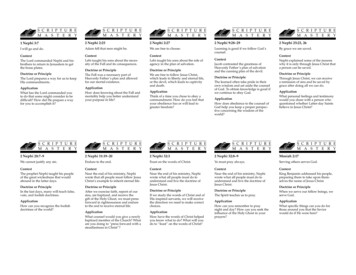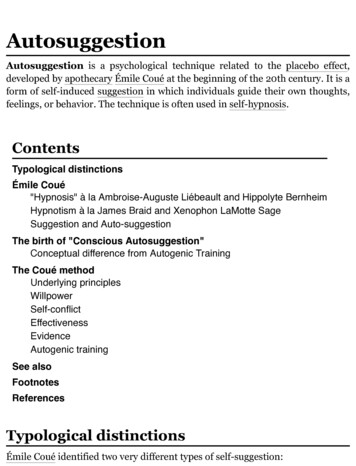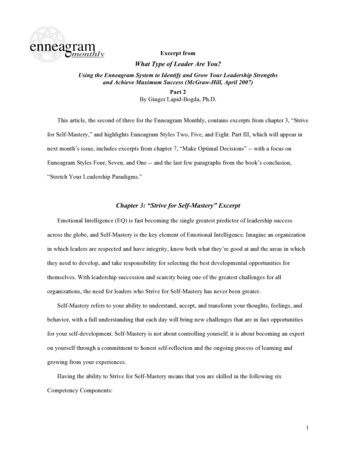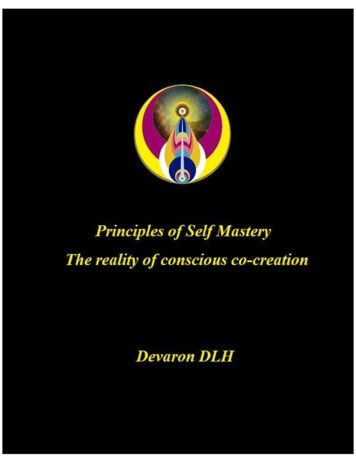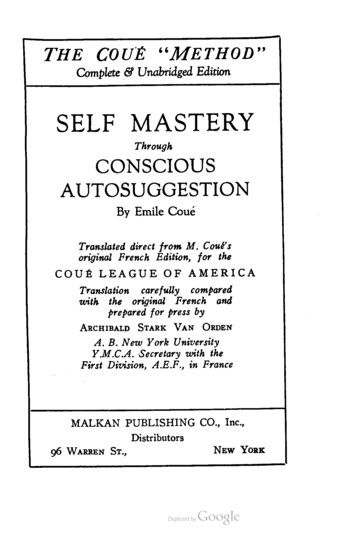
Transcription
THECOU "METHOD"Complete & Unabridged EditionSELFMASTERYThroughCONSCIOUSAUTOSUGGESTIONBy Emile CoueTranslated direct from M. CouS'soriginal French Edition, for theCOUfi LEAGUE OF AMERICATranslation carefully comparedwith the original French andprepared for press byArchibald Stark Van OrdenA. B. New York UniversityY.M.C.A. Secretary with theFirst Division, A.E.F., in FranceMALKAN PUBLISHING CO., Inc.,Distributors96 Warren St.,New York
11Copyright 1922 byMalkan Publishing Co., Inc.
ContentsINTRODUCTION: By Archibald Stark Van Orden5THE MIRACLE WITHIN: By M. Burnat-Provins9SELF MASTERY THROUGH CONSCIOUS AUTOSUGGESTION: By Emile CoueConscious Autosuggestion, 15—The Conscious Beingand the Unconscious Being, 16—Will and Imagination, 17—Suggestion and Autosuggestion, 21—TheUse of Autosuggestion, 22—How Suggestion Works,26—The Use of Suggestion for the Cure of MoralAilments and Congenital or Acquired Faults, 28.15THE "METHOD" APPLIED TO THE EDUCATIONAND CORRECTION OF CHILDREN : By Emile Coue. 31INSTRUCTIONS FOR PRACTITIONERS OF THE"METHOD"—How To Teach People To Make Autosuggestions: Advice And Instructions To His Pupils AndDisciples : By Emile Coue38Preparatory Experiments, 40—Curative SuggestionMethods, 44—The Superiority of This "Method," 49.WHAT AUTOSUGGESTION HAS DONE—Observationsof Some Remarkable Cures : By Emile Coue- S3Tuberculosis, 53—Congestion of the Lungs, 54—Asthma, 54—Bronchitis, 55—Senility of Larynx, 55—Pott's Disease, 55—Eczema, 56—Gout, 56—Club Feet,57—Rheumatism, 57—Palsy, 58—Stammering, 58—Kidney Disease, 58—Enteritis, 59—Nervous Dyspepsia, 60—Neuralgia, 60—Neurasthenia, 60—Varicose Ulcers, 62—Abscess, 63—Frontal Sinus, 63—Heart Disease, 63—Paralysis, 65—Womb Trouble,66—Metritis, 67.
THOUGHTS AND PRECEPTS OF EMILE COUfi:By Mme. Emile Leon68M. EMILE COUfi AT WORK IN HIS CLINIC.78LETTERSExtracts from letters addressed to M. Coue and toMme. Emile Leon and Mile. Kaufmant, his disciples.8gALL FOR EVERYONE : By Mme. Emile Leon105SOME NOTES ON M. COUfi'S TRIP TO PARIS112SUGGESTED LIST OF STANDARD BOOKS ON AUTOSUGGESTION, PSYCHOLOGY, etc119COUfi LEAGUE OF AMERICA-122
IntroductionThe pendulum of medical thought is swinging awayfrom materialism. The day of the predominance ofthe pill is past. Practitioners of all schools now realizethat a very large part of our weal and woe is the result of our thinking. Probably ninety per cent. of allcures have a mental basis independent of the apparentmaterial means employed. This is no argument againstv the physician or healer of any school, but it is an argument in favor of scientific understanding and employment of mental means for human betterment.Emile Coue stands out as leader of the great andever increasing host of those who believe that mind isthe principal factor in health and sickness. He tellsus that in every case the material element has its place,but that this place is one of subservience; that matteris servant, mind is master; and that matter will obeythe direction of mind, if the thing aimed at "is in anyway possible." This implies that there may be instances in which the desired thing "is not in any waypossible," but Coue' does not undertake to define thelatter class. After reading of the many cures inducedby his "method," one cannot avoid the conclusion thatfurther development and application of the "method"will greatly reduce the field now regarded as "the impossible."Coue is scientific. He does not start with a theoryand then try to prove it by logic; but he begins with"experiments" and builds up his theory inductively.He takes you to a clinic where things are being done,not to a lecture room where things are being discussed.5
6THE COV "METHOD"He recognizes the fact that people, not thoroughlyacquainted with his "method," may find in it muchthat "seems childish"; but his answer is, "it producesresults." One feels like paraphrasing the words of another: "The lame walk, the ill are made whole, andhappy are they who do not stumble at that which isseemingly too simple in my method."Coue is in line with a considerable number of scholarswho have studied and utilized hypnotism in its variousphases, particularly related to disease. For many yearsis was supposed that hypnotism and kindred phenomenawere abnormal, but we know now that these phenomenaare perfectly natural, that they have been the greatestfactors in all the ages for moral and physical healthor disease, and that the modern psychologist is merelyattempting to use consciously, for human good, thatwhich had previously been a great uncontrolled powerfor both good and ill.The unique contributions which Coue has made tohuman betterment are, his recognition of the primaryplace of the imagination in the cure of disease, and hisdevelopment of a "method" whereby the imaginationmay be energized and directed for its beneficent work.Our mentality is of two sorts, that which we useconsciously and that which we use unconsciously or subconsciously. Coue agrees with many others in recognizing this dual mentality. But no predecessor, I believe,has recognized the closeness of the relationship betweensubconscious mentality and the imagination. It wouldseem, at times, that the two are almost identical in histhought. Is it fair to interpret him as meaning thatthe imagination is at once the entrance and exit bywhich we open up our unconscious powers and drawthem out for our good or ill? Perhaps so, but he doesnot theorize much in this little book; his interest is
INTRODUCTION7rather in practical cures, and these are so wonderfulthat the reader will find his credulity put to the test.To this, your natural questioning, Coue and his disciples would say "come and see," which is after all theonly scientific test of anything.The formula, ' ' Every day, in every way, I am gettingbetter and better," Coue says, "covers all cases," and,regardless of the disease or difficulty, this formula repeated as directed produces results if they are "in anyway possible." Doubtless the thing which happens isthat the imagination takes hold of the general idea ofprogressive betterment, as suggested in the formula,and fills in the details of that idea with data of its ownexperience and hope. (The rheumatic patient, repeating the formula, sees himself in imagination reachingthe point where he can walk or run, etc.) Now, thewonder of the "method" is this, that this imagined curehas marvelous power to call into action the subjectivemind, which produces in reality the thing imagined.If the Coue "method" has such wonderful effect onthe unconscious personality for the cure of disease, whyshouldn't it have an effect along moral and social linesthat is equally wonderful? The fact seems to be thatthis process which Coue has learned to utilize for cures,is the process which has been back of every great historic movement. A person gets hold of an idea. Heholds it before his imagination until it possesses hissubjective mind and transforms him. He constantlygives the thought to others until they are transformed,and eventually the idea of the one man becomes thedominating force of whole nations.Mr. Coue's brief statement of the relation of his"method" to education is destined to become a classicon this vital subject. That education should begin atbirth and even before, that it is the duty of parents
8THE COUfi "METHOD"and relatives to see to it that the minds of children areplaced in the correct attitude toward their own development, that education consists in "self-mastery" and notin teaching subjects; in these matters and some othersthe "master" stands on common ground with manythoughtful people; but he advances beyond others inshowing a clear, scientific, and simple "method" of accomplishing these highly desirable results. The littlesection in this book which deals with this subjectshould receive the thoughtful attention of all who areinterested in the future of the children of this land.The name of the originator sometimes leaves its markin history. Such is Confucius. The history of Chinafor the past twenty-five hundred years is the outworking of the imagination of the Sage in the lives of theuntold millions of Chinese through those ages.Coue has taught us how the psychology of the mob isproduced. We are all changed into the image of thatwhich is held before the eyes of our imagination. Wecan change ourselves as we wish. We can be sick, orwell; good, or bad accordingly as we direct our imaginations this way or that. Perhaps we think there arelimitations; but let us not talk about those until wehave begun to approach them.We can have the kind of world we want to live in,as soon as we are willing to hold proper ideals beforeour imaginations until our unconscious minds changeus into that which we imagine. And don't forget thenight and morning repetition of the formula, and eventhe string with its twenty knots ; Coue has proven themto be effective.Archibald S. Van Oeden
The Miracle Within:A Tribute to Emile CoueBy M. Burnat-Provins.(Reprint from the "Renaissance Politique, literaire etartistique" of the 18th of December, 1920.)In September, 1920, I opened for the first time thebook of Prof. Charles Baudouin, of the institute j. j.rousseau of Geneva, entitled, suggestion and autosuggestion, and dedicated by the author :"with grateful acknowledgments toemile coue, the steadfast worker and pioneer."I did not put it down until I had read it through.It contains a very simple exposition of a magnificenthumanitarian work, based upon a theory which mayappear childish to some, because of its utter simplicity.But if anyone practices it he is bound to receive greatgood from it.During more than twenty years of indefatigablework, Emile Coui, who resides at Nancy (where hecontinued the work and experiments of Liebault, fatherof the doctrine of suggestion), for twenty years, I repeat, Coue studied this one subject, to the exclusionof everything else, for the purpose of helping his fellowcreatures by inducing them to cultivate the practice ofautosuggestion.At the beginning of this century, Coue had attainedthe object of his researches. He had discovered theimmense power of autosuggestion and the secret of itsapplication for general use; having made innumerableexperiments, with thousands of patients, he proved theaction of the subconscious on organic ailments.9
10THE COV "METHOD"This was something entirely new; and the greatmerit of this profoundly modest scholar is to havefound a remedy for terrible ills, heretofore consideredincurable, and without hope of relief, although, insome instances, extremely painful.As I cannot go into lengthy scientific details, I willjust tell how this learned man of Nancy practices hismethod.The substance of his teaching—clear cut as thoughin sculpture—found after a lifetime of patient researches, is summed up in a brief formula to be repeated morning and night.This formula must be repeated in a low voice (witheyes closed, body in a position that permits of relaxingthe muscular system—say in bed or in an easy chair)and in a monotonous tone, as if one were reciting alitany. The magic words are:"EVERY DAY, IN EVERY WAY, I AM GETTINGBETTER AND BETTER."They must be repeated twenty times, morning andnight. You may use a string with twenty knots on itwhich serves as an aid in counting just as a rosarydoes. This material aid is important; it insuresmechanical recitation, which is essential.While articulating these words which are registeredby the unconscious, you must not think of anything inparticular, neither of your illness nor of your troubles.You must be passive, with only the desire that all maybe for the best; the formula in every way has a generaleffect.Your desire must express itself without passion, gently and without exertion of your will, but with absolutefaith and confidence.For Emile Cou6, at the moment of inducing auto
THE MIRACLE WITHIN11suggestion, does not appeal to the will in any way. Thewill must not be exercised at all at that moment! Imagination only must come into play; that is the greatmotive power, infinitely more active than the will powerwhich is usually invoked.Have confidence in yourself . . . Believe firmly thatall will he well with you, says this great counsellor, and,indeed, all is well with those who have the unquestioning faith of a child, supplemented by perseverance.As facts and deeds speak louder than words, I willtell you of my own experience before I met M. Coue.I must go back to the month of September when Ifirst opened the book of M. Charles Baudouin; afterdetailed exposition of his subject the author notes complete cures of such maladies as: enteritis; eczema;stammering;dumbness; sinus—dating twenty-fiveyears back, with eleven operations;—metritis; salpingitis; fiberous tumor; varicose veins; etc. etc., and lastbut not least, deep tubercular sores and the last stagesof phthisis (as in the case of Mme. D., of Troyes, age30, who became a mother after her cure; this case wasfollowed up and there was no relapse). All this istestified to by attending physicians, who had treatedthe patients.These examples impressed me profoundly; some werereal miracles! It was not a question of nerves, but ofills for which there is no medicine as yet. Especiallythat case of tuberculosis was a revelation to me.Having suffered, myself, horribly from acute neuritisof the face, I know what real pain is. Four physicians,two of them specialists, had pronounced the sentence,"Nothing can be done for you," which, of itself alone,sufficed to increase the trouble by its fatal influenceon my mind: That "Nothing can be done" had inducedthe worst of autosuggestions.
12THE COUfi "METHOD"Once in possession of the formula: "Every day, inevery way, etc.," I recited it with a faith, which, although it had come suddenly, was none the less capableof removing mountains. I discarded shawls and comforters and, in wind and rain, went out into the gardenbareheaded, murmuring gently: "I am going to hecured; there will be no more neuritis; it is going away;it will not come back, etc." I was cured the very nextday; there was no more suffering from the abominablecomplaint, which had not allowed me to take a stepout of doors in windy or damp weather, and had madelife unbearable. Just imagine my intense joy ! Skepticswill say, "It was all nervousness." Obviously, and Iwill concede to them this first point. But, delightedwith the Coue method, I tried it for an oedema of theleft ankle, resulting from an affection of the kidneyswhich was said to be incurable. In two days the oedemahad disappeared. I then treated fatigue and mentaldepression, etc. An extraordinary improvement resulted andl had but one idea: to go to Nancy and thankmy benefactor.I went and found the excellent man who attracts allby his goodness and simplicity, and he became myfriend.It was indispensable to see him on his own field ofaction. He invited me to a popular clinic. There Iwitnessed a concert of gratitude—lesions of the lungs,displaced organs, asthma, Pott's disease ( !), paralysis—all this host of deadly diseases was put to flight. Isaw a paralytic who sat contorted and twisted in achair, get up and walk. Coue had talked to them urging each to have great confidence, an immense confidence in themselves. He said, "Learn to cure yourselves; you can. I have never cured anybody; theremedy is within yourselves. Call upon your spirit; let
THE MIRACLE WITHIN13it act for your mental and spiritual benefit and it willcome, it will cure you ; you will be strong and happy. ' 'Having spoken, Coue approached the paralytic andsaid to her: "You have heard. Do you believe that youwill walk? . . . "Yes." . . . "Very well then, get up\"The woman arose, she walked, and went around thegarden. The miracle was accomplished.A young girl afflicted with Pott's disease, whose vertebral column had become straight again after threetreatments, told me of the intense happiness she feltin being, so to speak, reborn after having been a hopeless cripple. Three women, cured of lesions of thelungs, expressed delight at being able to go back towork and to enjoy normal life.Coue, in the midst of these people whom he loves,appeared to me as a person apart; he ignores money;all his work is gratuitous and his extraordinary disinterestedness does not permit him to take a cent for it.I told him: "I owe you something—I owe youall!" His reply was: "No, the pleasure that I havein your continued well-being pays me abundantly."An irresistible sympathy draws you toward this plainphilanthropist who has the soul of a child. Arm inarm we walk around the kitchen-garden, which he cultivates himself getting up early to do so. He is practically a vegetarian and looks upon the results of hisgarden work with great satisfaction. He then resumesserious conversation. "You possess within you an unlimited power, your Unconscious being, commonly calledimagination. It acts on matter if we but know how todomesticate it. The imagination may be compared toa horse, improperly harnessed to your carriage, andwithout bridle or reins; that horse may perform allsorts of foolish tricks and cause your death. But,harness him properly, drive him with a firm hand, and
14THE COUfi "METHOD"he will go where you want him to. It is the same withyour Unconscious self, your imagination. You must directit for your own good. Autosuggestion formulated withthe lips, is an order which the Unconscious receives. Itcarries it out, unknown to ourselves, especially at night ;so that the evening suggestion is the most important.It gives wonderful results."When you feel physical pain add the formula: 'Itpasses, it passes.' Eepeat it very quickly, in a sort ofmurmuring voice, placing your hand on the achingpart, or upon your forehead if it is mental discomfortor distress. The method also acts very effectively onthe mind. After having called in the help of the soulfor the body, you can call on it again and again in allcircumstances and difficulties of life."I know from experience that unsatisfactory results,obtained by usual treatment, can be singularly modifiedby this process.You now know about it, and can know it still betterif you will read Mr. Baudouin's book, "Suggestion andAutosuggestion" and then his pamphlet: "Culture ofthe Moral Power," after reading this brief littletreatise, "Self-Mastery," written by Mr. Coue himself.Now, if I have been able to inspire you sufficientlyto make the pilgrimage to Nancy for yourself, you willhave the same experience that I had; you will love thisunique man—unique by reason of his noble charityand his unselfish love of his brethren as Christ hastaught it.And, like myself, you will be healed physically,morally and mentally. Life will seem more worth living and altogether more beautiful. And that is surelyworth trying for.
SELF MASTERY:ThroughConsciousAutosuggestionBy Emile Coue.Suggestion, or rather, Autosuggestion is in one sensean entirely new subject, although, at the same time,it is as old as the world itself.It is new in that, up to the present, it has not beenstudied from the correct viewpoint, and consequentlywrong conclusions have been formed. It is old becauseit dates back to the advent of man on Earth. Indeed,autosuggestion is an instrument which we possess whenwe are born. It is a force of wonderful and incalculablepower which produces, according to circumstances, thevery best or the very worst effects. A proper knowledgeof this force is useful to everyone, but, more particularly, it is indispensable to physicians, magistrates, lawyersand educators of the young.When one knows how to employ it consciously he can,first of all, guard himself against provoking harmfulautosuggestions in others, the consequences of whichmay be disastrous; furthermore, he can consciouslybring about helpful ones which restore physical healthto the sick, and mental and moral vigor to the nervously deranged—unconscious victims of previous hurtfulautosuggestions ; he can also guide into right, ways thosewho have a tendency toward evil.18
16THE COUS "METHOD"The Conscious Being and theUnconscious BeingIn order to understand the phenomena of suggestionor, more accurately, of autosuggestion, it is necessary torealize that there exist, within us, two beings absolutelydistinct from each other. Both are intelligent, but whileone is conscious, the other is unconscious. That is thereason why the existence of the latter is not generallyrecognized.The existence of this unconscious being may be easilyproved if one will only take the trouble to examine certain phenomena and to think a little, for example :Everybody is familiar with somnambulism. We allknow that the sleep-walker gets up during the nightand, without being awake, leaves his room, dressed orundressed, goes downstairs, walks along corridors and,after having performed certain acts or accomplishedcertain work, returns to bed. Next morning he is greatlyastonished at finding work finished which he had leftunfinished the night before.Nevertheless he himself did it, although he does notrecall anything about it. What power then did hjsbody obey, if not an unconscious force, his unconsciousbeing tConsider now, if you please, the regrettably frequentcase of the drunkard in a state of "delirium tremens."In a paroxysm of rage he takes up whatever weapon ishandy, a knife, hammer, axe, and strikes furiously atthose who have the misfortune to be near him. Whenthe paroxysm of rage has passed and he regains hissenses, he looks with horror at the scene of carnage,ignorant of the fact that he himself did it. Here again,
SELF MASTERY17isn't it the unconscious that has directed the actions ofthe poor wretch?*If we compare the Conscious with the Unconscious,we find that while the Conscious is endowed with a veryunreliable memory, the Unconscious on the contrary, isgifted with a marvelous memory which registers unfailingly, without our knowing it, every event and everyleast little thing that happens during our existence.Moreover it is credulous and accepts, without reasoning, what it is told. As the Unconscious directs andcontrols the working of all our organs by the intermediary of the brain an apparently paradoxical effect isproduced; that is, when it believes that a particularorgan is or is not in proper working order, or that wefeel such and such an impression, that organ, indeed,works properly or badly; or rather, we have the impression that it does.The Unconscious not only presides over the functionsof our organism but also over the performance of allour actions, whatever they may be.The Unconscious is what we usually call "imagination" and which, contrary to the common belief, alwaysmakes us act, even against our will, if there is antagonism between those two forces.Will and Imagination.When we open a dictionary and look for the senseof the word "Will" we find the following definition:"Faculty to freely determine all our actions." We accept this definition as true and indisputable, but thereis no greater fallacy. This will which we so proudly* And what aversions, what ills of various degrees, oftenhardly perceptible, we create in ourselves, all of us, by neglectingto counter-balance immediately the bad unconscious autosuggestions, by using good, conscious autosuggestions, thus bringingabout the cessation of much unnecessary suffering.
18THE C0V6 "METHOD"assert, always gives way to the imagination. This is anabsolute rule without a single exception.Blasphemy! Paradox! You say. Not at all. Truth!Absolute truth, I reply.And in order to convince yourself of this truth openyour eyes, look about you and try to comprehend whatyou see. You will then understand that what I assertis not an empty theory, engendered by a disorderedbrain, but the plain expression of an actual fact.Suppose that we place on the floor a plank 30 feetlong and 10 inches wide. It is evident that everybodywould be able to walk along that plank from one endto the other without stepping off. Now change the conditions of the experiment and suppose that this plankis placed, let us say, as high as the towers of a cathedral ;where then is the person capable of walking only asingle foot along that narrow path made by the board?Would you who read this be the one? Doubtless no.You wouldn't take two steps before you began to tremble and IN SPITE OF ALL THE EFFORTS OF YOUE WILLPOWER you would certainly tumble to the ground.Why is it that you do not fall when the plank is onthe ground? And how is it that you do fall when it israised to any great height? Simply because in the firstcase you imagine that it is easy to walk to the end ofthat plank, while in the second case you imagine thatit is impossible.Observe that you may will to walk along it, as muchas you please, but, if you imagine that you cannot, it isabsolutely impossible for you to do it.Dizziness is caused by the image formed in our mindsthat we are going to fall. This image transforms itselfimmediately into the act, in spite of all effortsof our will, and even the more quickly the more violentour will-efforts are to the contrary.
SELF MASTERY19Let us consider the case of a person afflicted with insomnia. If he makes no effort to sleep, he will restquietly in his bed. If, on the contrary, he "wants" tosleep, the greater his efforts to go to sleep the more restless he becomes.Have you ever noticed the fact that the more youtry to remember the name of a person which, for themoment, you have forgotten, the harder it becomes foryou to recall, until you dismiss the thought "I haveforgotten" and think instead "it will come back to mymind"; then the name comes to you naturally and without the least effort?Those who ride bicycles will readily recall their firstefforts. "While holding on tightly to the handlebarsfor fear of a fall, suddenly you observe in the road aharmless little pebble or perhaps even a horse. You tryto avoid the obstacle but, the more you try to avoid it,the straighter you go right to it.Who has not, at one time or another had an uncontrollable fit of laughter that became more uncontrollablewith each effort to suppress it?What was the state of mind of each of these persons ?"I do not want to fall but / can't help it. I want tosleep but cannot. I would like to remember the nameof Madame A., but I cannot. I want to avoid that obstacle but cannot. I want to suppress that laugh, but Icannot."You will readily see that in each case, though underdifferent circumstances, it was always the imaginationthat carried away the will, without a single exception.Similarly, we note an officer rushing forward at thehead of his troops ; his courageous example inspires themto follow; but the cry: "Save yourselves" causes a disorderly and fatal retreat. Why? In the first case, themen imagine that they must march forward and, in the
20THE C0U6 "METHOD"second, they imagine that they are beaten and must fleeto escape death.Panurge knew the contagion of example, or the forceof imagination, when, to take revenge on a merchantwith whom he sailed, he seized and threw overboard hisbiggest sheep, sure in advance, that the whole herdwould follow j which of course happened.We human beings, resemble more or less a flock ofsheep. Against our will we follow the example ofothers, imagining that we cannot do otherwise.I could cite thousands of other examples, only theenumeration would be tiresome. I cannot, however,omit emphasizing this factor of the enormous power ofimagination, otherwise called the Unconscious, in itsfight against the will.Drunkards would gladly stop drinking but they cannot control themselves. Ask them. They will tell you,in all sincerity, that they would like to be abstemious,that drink is disgusting to them, but that they are irresistibly driven to drink, in spite of their will, and inspite of the evil consequences which they know are sureto result.In the same manner criminals commit crimes in spiteof themselves. When you ask them why they have actedthat way, they reply: "I could not help myself, I waspushed to it, it was beyond my power of resistance."And the drunkard as well as the criminal speaks thetruth : They are forced to act as they do because theyimagine that they cannot help themselves.I do not say that your will is not a power. On thecontrary, it is a great force; but it almost always turnsagainst you. Your state of mind must be: "I desireto do (or to have) such and such a thing and I amabout to do (or to have) it." If you make no willefforts you will succeed.
SELF MASTERY21Now then, we who are so proud of our willpower; wewho think that we act voluntarily; we are, in reality,only poor puppets directed by our imagination whichholds the reins. We cease to be puppets only after wehave learned to consciously direct our imagination.Suggestion and Autosuggestion.We may properly compare the imagination to a torrent which carries to destruction the unlucky one whogets into its current, even in spite of his will and effortsto reach shore. This torrent appears indomitable. Butif you know how, you may turn it from its course, divertit, as it were, to the factory, and transform its forceinto useful driving power, heat and electricity.Again, we may liken the imagination to a wild horsewith neither bridle nor reins. What else can the riderdo but to let the horse carry him where it will? Then,if the horse stumbles, the rider plunges into the ditchwhich stopped its mad career. But consider, if the riderputs bridle and reins on the horse and breaks it to harness, the roles are changed. The horse no longer goeswherever it wants to; it is the rider who now controlsand directs all its movements.What is suggestion? One could define it as "the actof imposing an idea on the brain of another person."Is such an action really possible? Properly speaking,no. Suggestion does not actually exist by itself. It doesnot exist, and cannot exist except on the distinct condition, sine qua non, that it transforms itself in the otherperson's mind into autosugges
SUGGESTION: By Emile Coue _ 15 Conscious Autosuggestion, 15—The Conscious Being and the Unconscious Being, 16—Will and Imagina tion, 17—Suggestion and Autosuggestion, 21—The Use ofAutosuggestion, 22—How SuggestionWorks, 26—The Use of Suggestion for the Cure of Moral Ailments and Congenital or Acquired Faults, 28.

